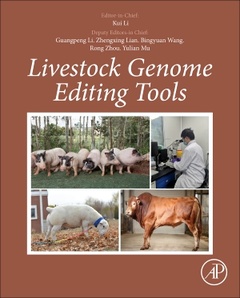Livestock Genome Editing Tools
Coordonnateurs : Li Kui, Wang Bingyuan

Written by international experts who have been working on livestock genetic editing field for more than 30 years, this book provides extensively theoretical and practical experience for readers to master the latest developments. This book explores the importance of research and application, as well as operation procedures, of livestock genetic editing tools. The writing of operation details makes this book an accessible read.
This book is an important resource for researchers interested in genome-edited animals and scientists and technicians in breeding institutions and is also of interest to students major in animal reproduction and biological engineering.
- The development of genome editing technology in animals
- New tools for genome editing
- Associated technologies for genome editing
- Application status of genome-editing tools in pig
- Application state of genome-editing tools in cattle
- Application status of genome-editing tools in sheep and goat
- Evaluation and detection of genome-edited livestock
- Breeding by molecular writing: the future development of livestock breeding
Dr. Kui Li is a Professor at Chinese Academy of Agricultural Sciences. He graduated from Wuhan University of China and appointed as a full Professor at Huazhong (Central China) Agricultural University and Chinese Academy of Agricultural Sciences in China since 1996, respectively. He used to be a visiting scholar at the University of Sydney, Australia and a full-time visiting Professor at the Cornell University, USA. Prof. Li’s research interests include pig genome and breeding, pig genetic engineering, experimental mini-pigs and medical models. He has been working on these fields for more than 3 decades. Since 1996, Prof. Li systematically compared the multi-omics of different developmental stages of Chinese and Western pig breeds and found lots of multi-level molecular markers. He also identified several hundreds of molecular markers related to porcine economic traits which are used to develop pig breeds. He established steady platforms for porcine somatic cell nuclear transfer, pronuclear injection, and genome editing techniques. He also established the techniques to develop genetic modified pigs with multi-gene compound traits, controllable expression and friendly gene locus site directed integration. Excitingly, Prof. Li’s research group generated more than 20 new breeding materials for agriculture including MSTN-edited pigs, anti-porcine reproductive and respiratory syndrome pigs. His research group also generated genome edited pigs for biomedicine including cardiovascular disease and diabetes models, which showed great application perspective. Prof Li is a founder of Agsino Gensources Co., Ltd., an animal biotechnology breeding company.
Dr. Bingyuan Wang is an Associate Professor at the Institute of Animal Sciences, Chinese Academy of Agricultural Sciences. In 2014, she graduated from Max Planck Institute for Molecular Biomedicine in Germany. From 2015 to 2023, she worked in the Porcine Gene Engineering and Plasma Innovation group, which is l
- Provides operable experimental procedures of pigs, cattle, and sheep genome editing tools
- Introduces the evaluation, breeding process, and application of each of the latest and most effective tools
- Examines the importance of livestock germplasm innovation, breed improvement, and human disease model generation
Date de parution : 04-2024
Ouvrage de 442 p.
19x23.4 cm
Thèmes de Livestock Genome Editing Tools :
Mots-clés :
livestock; cattle; sheep; swine; CRISPR; CAS-9; ZFN; TALEN; genetic editing tools; base editing



